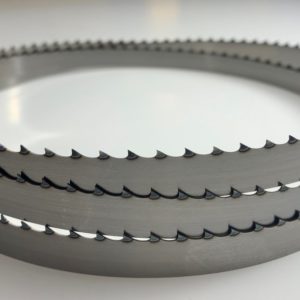Custom Band Saw Blades
We provide custom band saw blade services to meet your specific cutting needs. (Note – largest size available 1/2″ – will send larger requests to our sister store in Nevada).
Bandsaw blades are measured by a few standard metrics: Length of the blade, height of blade, width of the blade, and teeth per inch (TPI). For example: 119″ x 1/2″ x .025 x 10 TPI.
It is important to note that tooth per inch can come as a singular number, or a double – meaning that every inch the tooth count alternatives. The first inch may have 8 teeth, where the second inch may of 10 inch.
The more teeth, generally the finer the cut. That said, a finer cut may not be idea for what you are cutting. A log, for example, you may want less teeth – 6 or 8. Cutting boards for cabinets, on the other hand, ya might 16/18.

Types of Material and Their Uses
Bi-Metal/ Diamaster = Alloy Steal
Good for Metal working – 95% of companies and individuals cutting the following materials should use a bi-metal band saw blade: carbon steel, tool steel, structural steel, stainless steel, pipes/tubing, die steel, angles, flat stock and mixed metal applications.
Neo-Type/ Flexback / Coil Coil = Carbon Steel Saw Blades
There are two different types of carbon steel blades– Carbon Flexback and Carbon Hardback. Both Carbon Flexback and Carbon Hardback will cut the following: mild steels, copper, wood, plastic, cast iron, cork, brass, lead, furniture, resawing projects, bronze, zinc, fiberglass, and non ferrous metals. The difference in the blades is right there in the names. In Carbon Hardback blades, both the teeth and the backer of the blade have been heat treated, providing stronger beam strength. Only the teeth are heat treated on Carbon Flexback blades to allow for a flexible backer suitable for contour cutting.
